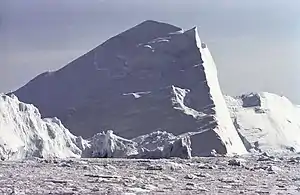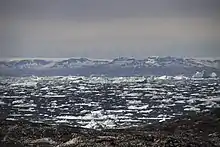Ilulissat Icefjord
Ilulissat Icefjord (Greenlandic: Ilulissat Kangerlua) is a fjord in western Greenland. Located 250 km north of the Arctic Circle, the Ilulissat Icefjord runs west 40 km (25 mi) from the Greenland ice sheet to Disko Bay just south of the town of Ilulissat.[1] Ilulissat Icefjord was declared a UNESCO World Heritage Site in 2004 because of its natural beauty and the importance of the fast-moving Jakobshavn Glacier in developing the current scientific understanding of anthropogenic climate change.[1]
| UNESCO World Heritage Site | |
|---|---|
 Iceberg making its way through Ilulissat Icefjord | |
| Location | Avannaata, Greenland |
| Criteria | Natural: (vii), (viii) |
| Reference | 1149 |
| Inscription | 2004 (28th Session) |
| Area | 402,400 ha (994,000 acres) |
| Coordinates | 69°08′N 49°30′W |
 Location of Ilulissat Icefjord in Greenland | |
Geography

The fjord contains the Jakobshavn Glacier (Greenlandic: Sermeq Kujalleq), the most productive glacier in the Northern Hemisphere. The glacier flows at a rate of 20–35 m (66–115 ft) per day, resulting in around 20 billion tonnes of icebergs calved off and passing out of the fjord every year.[1]
Icebergs breaking from the glacier are often so large —up to a kilometer (3,300 ft) in height— that they are too tall to float down the fjord and lie stuck on the bottom of its shallower areas, sometimes for years, until they are broken up by the force of the glacier and icebergs further up the fjord. On breaking up the icebergs emerge into the open sea and initially travel north with ocean currents before turning south and running into the Atlantic Ocean. Larger icebergs typically do not melt until they reach 40-45 degrees north —further south than the United Kingdom and level with New York City.[2]
See also
References
- "Ilulissat Icefjord". UNESCO World Heritage Centre. United Nations Educational, Scientific, and Cultural Organization. Retrieved 19 Jun 2021.
- "Explore Ilulissat Icefjord – teaching material from GEUS". Archived from the original on 2018-04-06. Retrieved 2016-01-22.
Bibliography
- Ilulissat Icefjord. Book edited by Ole Bennike, Naja Mikkelsen, Greg McCollum, Henrik Klinge Pedersen and Anker Weidick, Geological Survey of Denmark and Greenland, 28 September 2004, ISBN 87-7871-136-3
External links
 Media related to Ilulissat Kangerlua at Wikimedia Commons
Media related to Ilulissat Kangerlua at Wikimedia Commons- NASA study: Fastest Glacier in Greenland Doubles Speed
- Ilulissat Icefjord UNESCO Website
